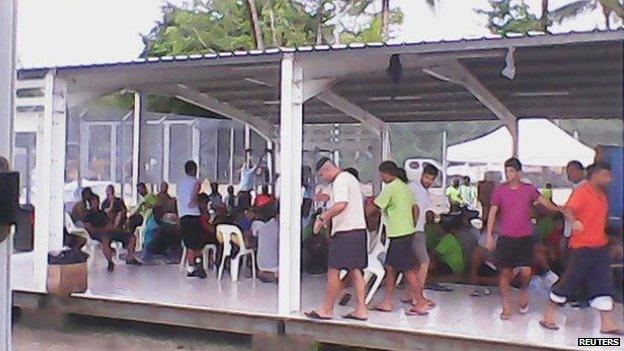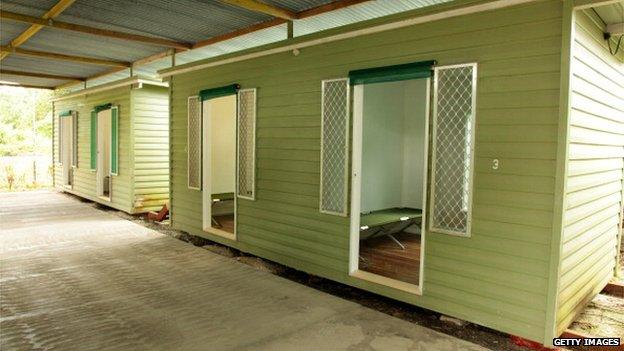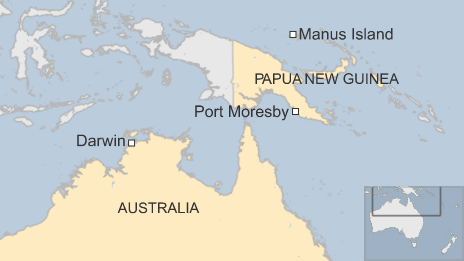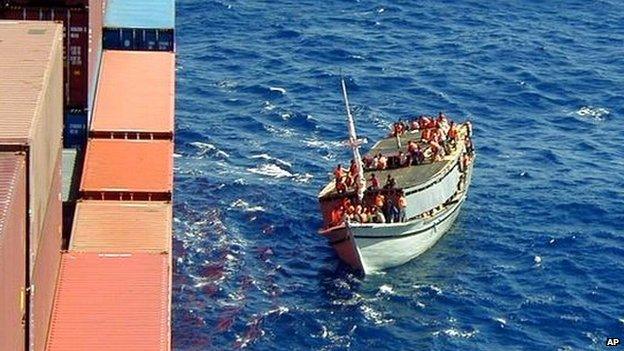Manus Island: Australia asylum seekers 'on hunger strike'
- Published

Rights groups have criticised conditions at the Manus Island camp
Hundreds of asylum seekers at the Australian-run Manus Island centre in Papua New Guinea have gone on hunger strike in protest over their conditions, rights groups say.
More than 200 detainees are said to be taking part in the strike. At least 10 are said to have sewn their lips shut.
Australia's government has denied a hunger strike is taking place.
The policy of housing asylum seekers offshore - intended as a deterrent - has been criticised by rights groups.
Australia sends all asylum seekers arriving by boat to offshore camps in Papua New Guinea and the Pacific territory of Nauru for detention and processing.
The Manus Island centre was the scene of deadly riots last February, when local residents entered the facility and clashed with detainees. One asylum seeker was killed and at least 70 were hurt in the violence.
The latest protest started at the Mike compound, with asylum seekers going on hunger strike and refusing to return to their accommodation.
At least 10 people have sewn their lips shut, according to sources quoted by the Sydney Morning Herald newspaper.

The Manus Island centre is home to just over 1,000 asylum seekers
One person - an Egyptian Christian man - has swallowed several razor blades, the Australian Broadcasting Corporation reports.
An asylum seeker at the centre said 220 people had gone on hunger strike and more were joining them, according to an audio recording provided by campaign group Refugee Action Coalition.
The asylum seeker said the detainees wanted Australia to hand them over to the United Nations if it was unwilling to accept them.


Australia and asylum
Asylum-seekers - mainly from Afghanistan, Sri Lanka, Iraq and Iran - travel to Australia's Christmas Island on rickety boats from Indonesia
The number of boats rose sharply in 2012 and the beginning of 2013, and scores of people have died making the journey
Everyone who arrives is detained. They are processed in camps in Christmas Island, Nauru and Papua New Guinea. Those found to be refugees will be resettled in PNG or Cambodia, not Australia
The government is believed to be towing boats back to Indonesia. It has also returned asylum seekers intercepted at sea to Sri Lanka
Rights groups and the UN have voiced serious concerns about the policies

"We are in very bad situation and we won't go back to our rooms in any condition... we will stay outside until we get our answer," the asylum seeker says, in the recording.
Under laws brought in by the previous government, none of the people held in offshore camps can expect to be resettled in Australia - even if they are found to be genuine refugees.
'Incorrect reports'
Tensions at the Manus Island centre have been growing, with many of its inhabitants now held there for more than 18 months.
The hunger strike is believed to have started after detainees were told they could no longer use running water to wash themselves because of a technical problem.
Detainees are also said to have been angered by reports that some of them will be moved to a separate facility, where they fear they could be vulnerable to attack by locals on Manus Island.
"Things have just come to a head. It's impossible to exaggerate the real fears that people have for their safety and for their lives," the executive director of Refugee Action Coalition, Ian Rintoul, told Reuters news agency.

The government says its policies mean asylum seekers are no longer attempting dangerous sea crossings
The Immigration Department denied the reports of a hunger strike at Manus Island.
"The government is advised... that a number of transferees have engaged in a peaceful protest and that media reporting that transferees are refusing food and fluid is incorrect," it said.
The government says its tough policies are aimed at ending the flow of boats carrying asylum seekers, so that no more people die making the dangerous journey to Australia.
Only one such boat reached Australia during 2014, compared with the 401 which successfully reached shore in 2013, according to local media reports.